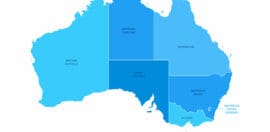Over 3 million Australians locked into poverty

24 February 2020 at 5:18 pm
The poverty rate in Australia is worse than in most other wealthy countries
Fewer entry-level jobs, rising housing costs, and inadequate welfare rates are just some of the contributing factors to more than one in eight adults living in poverty, with sector leaders banding together to call for immediate action.
The latest Australian Council for Social Services and UNSW Sydney poverty report revealed more than 3 million Australians are living below the poverty line, including 774,000 children.
The child poverty rate was found to be consistently higher than overall poverty, ranging from 18 per cent to 16 per cent over the past decade. The rate now sits at 17.7 per cent – more than one in six children.
The report also found that poverty has not only remained consistently high but the depth is getting worse, with households in poverty on average living 42 per cent below the poverty line, up from 35 per cent in 2007.
ACOSS CEO Cassandra Goldie said it was not right that one of the wealthiest countries in the world has such a high rate of poverty.
“Our economy is leaving people behind, with persistently high poverty rates despite decades of uninterrupted economic growth,” Goldie said.
“People living in poverty include young people working to get their foot in the door of the competitive job market, single parents juggling caring responsibilities, and older people confronting age discrimination.”
The poverty line was measured at $457 per week in 2017-18 for a single adult and $960 per week for a couple with two children.
The report’s lead researcher, UNSW Sydney associate professor Dr Bruce Bradbury, said the poverty rate in Australia was worse than in most other wealthy countries.
“This includes New Zealand, Germany and Ireland,” Bradbury said.
The drivers of poverty
Goldie said the rising cost of housing, stagnant income support payments and a changing job market was locking people in poverty, and it was clear something needed to change.
“The government can reduce poverty by boosting growth in jobs, increasing Newstart and Rent Assistance, and investing in social housing to ensure everyone has a safe place to call home,” Goldie said.
Mission Australia CEO James Toomey said the report highlighted why investment in social and affordable homes was critical to avoid low-income earners falling into homelessness.
“We urgently need more social and affordable homes and an increase in Commonwealth Rent Assistance if Australia is to have any hope of addressing poverty and ending homelessness,” Toomey said.
Calls to fix Newstart grow louder across the sector
Leaders from major community sector groups such as Anglicare Australia, St Vincent de Paul and cohealth, joined ACOSS in using the report to renew calls for a $95 a week increase to Newstart – which hasn’t increased in real terms in 26 years.
Anglicare Australia CEO Kasey Chambers said the report should shock all Australians.
“We know what needs to be done to turn this around. The government must raise the rate of Newstart and invest in affordable housing,” Chambers said.








A Report coming out of Victoria indicates that up to 20% of the injured worker community live in poverty, many of them are needing to sell personal belongings in order to buy basics.
Many are unable to keep up pay rent or need to sell their homes due to inability to meet mortgage payments.
What the majority of people simply do not understand is that the injured worker community are not “seen” simply because the ATO and ASIC deem them to be employed so they are not “at risk”.
The injured worker community are unable to access food relief from main stream charities because they lack a healthcare card.
Likewise the injured worker community are unable to access relief from unities expenses school fess car registration because they do not have a healthcare card.
Every mainstream “ill” is found within the injured worker community- domestic violence, homelessness, drug and alcohol addiction, poverty in all its guises.
And no one is talking about any of it.
This is not a shock to us living under these dire circumstances and probably not those in Canberra (remember the politician who stated that they could live on Newstart). It is an absolute disgrace. I am tired of all the Royal Commissions (and the money that is spent on these) when they deliver no real or sustainable tangible benefit (and as a victim of childhood sexual and physical abuse – that Royal Commission delivered nothing to me). I am tired of all the wasted foreign aid (eg nearly $500m a year to Indonesia and yet recently that spent that and more on military purchases – who is kidding who). I am tired of the outrageous salaries and perks of politicians and public servants and for what – again we see no tangible or sustainable output from these people. I am tired of the Investment Board selling off Australia and again seeing no tangible or sustainable benefit to Australians, other more Industry being closed and jobs lost. Australia has lost its way, its soul and compassion. It is time we began looking after our own backyard before we no longer have a backyard.
Most Australians are aware of increasing poverty and none of us would be surprised at this report. When you have a government that closes its eyes to organisations that do not pay their fair share of tax via offshore tax vehicles and, instead, prefers to hit the most vulnerable, simply because it can, then why are we surprised. People that have saved for their retirement years to be self-sufficient are punished by harsh rules and taxes. Pensioners and disabled are treated like flotsam and forced to live on or below the poverty line. The big end of town and high worth individuals are protected complex tax loopholes. The government taxes away every incentive for individuals to work hard and try and get ahead because anything you have worked hard and saved for, the govt. is right behind you ready to take it all away. What I have seen so far is nothing other than career politicians looking after themselves very well from the govt. rough and exerting no effort to promote and create an educated, healthy and wealthy population – shame on them all!
Hi Meggie
Can you please advise if the $457/week for single and $960/week for couple with two children, are these figure represent the income after or before income tax?
Australia has the highest rate of population growth in the developed world. This is a major factor in why housing costs are high. Demand exceeding supply. One in eleven people in Australia are on temporary work visas, that is reducing the number of entry level jobs. Supply exceeding demand. Time to call for cuts to our vastly expanded immigration program, it is clearly making the rich richer and the poor poorer.
The current system in austalia is wrong when 10 billion goes to pay welfare and 80 billion in tax cuts for wealthier families in education negitive gearing so they can purchase property and rent to people who cant afford there excessive rent prices that eventually end up homeless or worse .millions of australians are living in poverty and in a conversation with a family member who is wealthy thinks that all people lin australia live in relatively luxury as they do. and poverty isnt an issue in australia. This is due to lack of main media cover and only written as a secondary story in passing. Making it look like its not really a problem in Australia .the government let ministers who live on thousands a week live on a few hundred a week to cover there living expenses and see how till they have to sell value there houses there boats and holiday homes no more great holidays for there family and end up depresed or worse depressed drug dependent and feeling worthless having to eat cheap process food and there health deteriorating and no light at the end of the tunnel